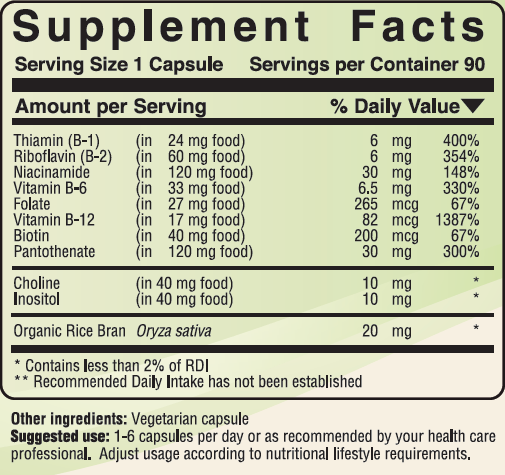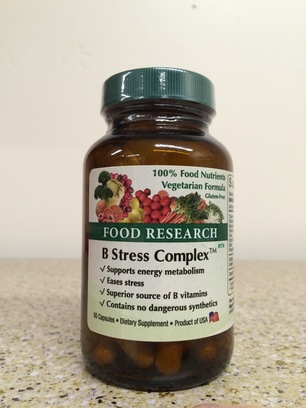
B Stress Complex
90 Capsules $30.98
90 Capsules $30.98
There is no doubt that we live in a high stress society. Not only do we live and work in unnatural environments, our foods are vastly different than they were 150 years ago. Until relatively recently, no human ever consumed synthesized isolated USP vitamins. Should stress vitamin formulas be primarily synthetic substances which can add stresses to the body? We think not! Food nutrients are natural for the body and are preferred for stress handling for humans:
 |
 |
| Food Vitamin C | Regular 'Natural' Ascorbic Acid |
Food Nutrients Are Not the Same as USP!
Food nutrients are not structurally, nor in most cases chemically, the same as USP isolates. Electron microscopy reveals that isolated USP form vitamins have a crystalline appearance whereas Food nutrients have more of a rounded appearance. Food nutrients also appear smaller than USP form vitamins and minerals. Nutrition scientists understand that smaller particle size improves bioavailability [1], “Small particles greatly enhances digestion in the small intestine, because the smaller particles of food have a larger ratio of surface to mass” [2] (the main function of digestion is to get Food particles small enough to be absorbed by intestinal villi [1,2]). Food nutrients do look different to the human eye.
How Much Better are Food Vitamins?
| Doctors’ Research Food | Compared to USP Vitamin/Mineral Salt |
| Vitamin B-1, Thiamin | Not a different chemical compound |
| Vitamin B-5, Pantothenate | Not a different chemical compound |
| Vitamin B-6 | Not a different chemical compound |
| Vitamin B-9, Folate | More utilizable above 266mcg (RDI is 400mcg) [3] |
| Vitamin C | Up to 15.6 times antioxidant effect [4] |
| Magnesium | Better absorbed and retained |
Zinc |
Better absorption |
Synthetic ‘nutrients’ do not do all the functions that natural ones do [1,2], so why would anyone want to take them?
Natural vs. Synthetic Vitamins and Stress
“Synthetic thiamin is usually marketed as thiamin hydrochloride or thiamin mononitrate” [5] and is a “coal tar derivative” [6] (most synthetic vitamins are petroleum derivatives). No thiamin hydrochloride or thiamin mononitrate is naturally found in any Food (thiamin pyrophosphate is the most common Food form of vitamin B-1 [2]). Other synthetic B vitamin forms include pyridoxine hydrochloride, folic acid, pantothenic acid, and cyanocobalamin--these are all crystalline in structure whereas B vitamins in Food are never crystalline. Research show that the bioavailability of Food nutrients are greater than that of isolated USP vitamins [7-9]. Why should anyone take large amounts of cheap synthetic USP imitation vitamins (even if the labels say ‘natural’) which themselves can add stresses to the body?
B vitamins and certain herbs have been shown to help reduce stress (e.g. B5-pantothenate is even known as the “anti-stress vitamin”) [2,10,11]. Natural Food B-complex vitamins (B1, B2, B3, B5, B6, B8-inositol, B9-folate, B12) are necessary for energy metabolism and inadequate amounts can lead to pernicious anemia, low hemoglobin counts, skin problems, nervous system problems, and even serious mental problems [2]. Vitamin C “can readily donate electrons to quench a variety of reactive free radical and oxidative species and is easily returned to its reduced state...The vitamin efficiently scavenges hydroxyl, peroxyl, and superoxide radicals, as well as reactive peroxide, singlet oxygen, and hypochlorite species” and protects against lipid and low-density lipoprotein (LDL) peroxidation” [2].
Other Nutrients In B Stress Formula
Dr. Bernard Jensen has written, “Magnesia, an inorganic substance,...is actually a combination of oxygen and magnesium...Man must have the biochemic (organic) form--food magnesium--rather than the inorganic form...The patient who is highly nervous, excitable, overly emotional and erratic in actions needs magnesium as a sedative” [12]. He also wrote, “Health in general, mental and physical, is accentuated by potassium...Potassium is essential for normal heart rhythm, other muscle contraction, normal nerve activity...All drug forms are contraindicated...Potassium Must be Supplied in Food Form” [12]; potassium may be helpful because it is one of the body’s most important electrolytes and is involved stimulating aldersterone for the adrenal glands [13]. Zinc is an important anti-oxidant; deficiencies can lead to behavioral disturbances [2].
The Foods in B Stress Complex naturally contains the antioxidant nutrients superoxide dismutase (S.O.D.) and betacarotene (listed on the label as vitamin A). S.O.D. “is one of the most important enzymes that functions as a cellular antioxidant...The absence of this enzyme is lethal” [2]. Studies show that antioxidant S.O.D. appears to have protective effects for the heart, lungs, joints, kidneys, liver, muscles, and skin [14]. Betacarotene is converted, rather slowly, to vitamin A [2]; “vitamin A is essential, either directly or indirectly, for the proper functioning on most organs of the body” [2] and may prevent stress-induced immunological disorders [15].
B Stress Complex is a truly Food supplement for today’s stressful society. It is a very popular with vegetarians, as well as anyone interested in a non-synthetic B complex formula.
B Stress Formula naturally contains carbohydrates, lipids, proteins (including all ten essential amino acids), and superoxide dismutase as found in specially grown, enzymatically processed Saccharomyces cerevisiae, Rice bran Oryza sativa, and Alfalfa sprouts & plant Medicago sativa all the nutrients shown above are contained in these foods (some foods contain multiple nutrients). Unlike many so-called "natural" formulas, B Stress Formula is only comprised of foods, contains no synthetic USP nutrients or isolated mineral salts, but only contains foods, food complexes, and
Numerous university studies have concluded that supplements containing food nutrients are better than USP isolates. Food nutrients are better because they contain important enzymes, peptides, and phytonutrients CRITICAL to the UTILIZATION of vitamins and minerals which are not present in isolated USP nutrients. Published research has concluded that food vitamins are superior synthetic/USP vitamins.
Suggested use: 1-2 tablets per day or as recommended by your health care professional. Adjust usage according to nutritional lifestyle requirements.
References
[1] Jenkins DJA, Wolever TMS, and Jenkins AL. Diet Factors Affecting Nutrient Absorption and Metabolism. In Modern Nutrition in Health and Disease, 8th ed. Lea and Febiger, Phil.:583-602, 1994
[2] Shils ME, Olson JA, Shike J. Modern Nutrition in Health and Disease, 8th ed. Lea and Febiger, Phil., 1994; 9th ed. Williams & Wilkins, Balt., 1999
[3] Lucock M. Is folic acid the ultimate functional food component for disease prevention? BMJ, 2004;328:211-214
[4] Williams D. ORAC values for fruits and vegetables. Alternatives, 1999;7(22):171
[5] Macrae R, Robson RK, Sadler MJ. Encyclopedia of Food Science and Nutrition. Academic Press, NY, 1993
[6] Haynes W. Chemical Trade Names and Commercial Synonyms, 2nd ed. Van Nostrand Co., New York, 1955
[7] Ha SW. Rabbit study comparing yeast and isolated B vitamins (as described in Murray RP. Natural vs. Synthetic. Mark R. Anderson, 1995, p:A3). Ann Rev Physiol,1941; 3:259-282
[8] Thiel R. Natural vitamins may be superior to synthetic ones. Med Hypo, 2000;55(6):461-469
[9] DeCava JA. The Real Truth About Vitamins & Antioxidants. A Printery, Centerfield (MA), 1997
[10] Understanding Vitamins and Minerals. Rodale Press, Emmaus (PA), 1984
[11] PDR for Herbal Medicine, 2nd ed. Medical Economics, Montvale (NJ), 2000
[12] Jensen B. The Chemistry of Man., vol I. Bernard Jensen Enterprises, Escondido (CA), 1983
[13] Guyton AG, Hall JE. Textbook of Medical Physiology, 9th ed. W.B. Saunders Co., Phil., 1996
[14] Null G. The Clinician’s Handbook of Natural Healing, Kensington, NY, 1998
[15] Pletsityi KD, et al. Immuno-correcting activity of vitamin A in stress. Buill Eksp Biol Med, 1987; 104(11):609-611
Some of these studies (or citations) may not conform to peer review standards. Therefore, the results are not conclusive. Professionals can, and often do, come to different conclusions when reviewing scientific data. None of these statements have been reviewed by the FDA. All products distributed by Doctors’ Research, Inc. are nutritional and are not intended for the treatment or prevention of any medical condition.
 |
||
|
||
